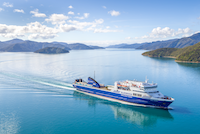Top Tips for Travellers to New Zealand
Planning a trip to New Zealand?
Watch the helpful top traveller tips video to find out about the top seven tips that visitors wish they had known before travelling to New Zealand.
View the video in Chinese.
Top Seven Tips
 1) Driving in New Zealand
1) Driving in New Zealand
Driving in New Zealand is a lot like driving in other parts of the world. Important things to remember are that we drive on the left hand side of the road, you need to have your full drivers licence, and you need to wear a seatbelt.
The driver is also not allowed to be drunk or use their phone while driving.
 2) Unusual New Zealand Road Signs
2) Unusual New Zealand Road Signs
Many New Zealand road signs are self explanatory, for example the speed limit, no parking or roadworks sign. Right of way signs (big white arrow and small red arrow on blue rectangle) are found on one lane bridges – If the white arrow points in the direction you're travelling it means you can go onto the bridge first (provided there is no oncoming traffic on the bridge already).
When approaching a railway line, 'Rail Crossing' signs will be visible. You need to slow down and check it's clear before crossing. At roundabouts, 'Give Way' signs will be present – you need to give way to your right, and check there are no oncoming vehicles before proceeding.
 3) Route Planning
3) Route Planning
For a small country, New Zealand has a lot to see. And often locations that seem close together on a map can be quite far away due to difficult terrain and winding roads. If you are planning to do a lot of driving, it's a good idea to fill up the petrol tank and stock up on groceries when you can.
See some suggested New Zealand driving routes.
 4) Buying Food
4) Buying Food
Supermarkets in New Zealand are well stocked with just about everything you need. From coffee to eggs, milk, bread or cereal – all the essentials are there. Shopping at a supermarket is also likely to be cheaper than buying goods at a convenience store or dairy. At some supermarkets you may be asked if you have a coupon or Fly Buys card, these are discount or loyalty cards, so simply say no if you don't have them.
The next question you'll be asked is how you'd like to pay, usually eftpos or credit card. Eftpos is everywhere in New Zealand, but isn't usually compatible with overseas debit and credit card systems. You can try to use it, but don't be alarmed if it doesn't work. The most reliable method is to use your credit card and when asked for a PIN number or to sign, choose to sign for it, or simply press enter on the terminal and then sign your receipt. Carrying some cash around with you is also a good idea, as many small stores do not accept credit cards.
Tipping is not expected in New Zealand, and you will not be considered rude if you only pay the amount on the bill.
 5) Road Hazards
5) Road Hazards
If you see someone waving their arm up and down on the side of the road, this usually means there is a hazard ahead. Farmers will also usually put out a sign to warn if they are moving stock, usually this is bright orange, but other times may just be a simple piece of cardboard. If the road is completely blocked by stock, just pull over on your side of the road, and enjoy being part of this New Zealand experience.
If there is a slow moving tractor (or other farm vehicle) on the road, slow down and pass when it is safe to do so
If you are driving, and traffic is backing up behind you, simply pull over when it is safe to do so, and allow the other vehicles to pass.
 6) Where to Stay?
6) Where to Stay?
There are a number of accommodation options throughout New Zealand, from budget to luxury. Advanced bookings are advised, especially during the busier summer months. Visitor iSites are great to help plan the next step of your travels, and can often supply you with a map of the area.
Campervans are a popular option, they give you the freedom to travel when (and where) you want. Be aware though, that there are Freedom Camping rules – this helps keeps New Zealand beautiful for everyone. You can download the CamperMate App for your smartphone – it lists the locations of public toilets, campsites, supermarkets and more.
 7) Stay Longer
7) Stay Longer
The number one wish of most visitors to New Zealand is that they'd stayed longer and had more time to explore this wonderful country. So plan for a few extra days, or perhaps see part of the country, and then the rest when you visit again.













